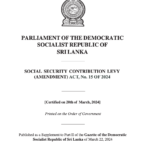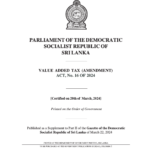If taxes are avoided, the consequences can be severe and include penalties, interest on the unpaid amount, and legal action. Here are the specifics based on the provided context:
- Penalties for Late Payment: According to the Inland Revenue Act No. 24 of 2017 (Page 172), if you fail to pay the tax due for a tax period within fourteen days of the due date, you will be liable to a penalty equal to twenty percent of the amount of tax due but not paid.
- Penalties for Tax Avoidance: As per the Inland Revenue Act No. 10 of 2006 (Page 226), if a bank, financial institution, or company fails to deduct income tax from interest paid, a penalty equivalent to five hundred percent of the tax avoided can be imposed.
- Lien on Property: The Inland Revenue Act No. 24 of 2017 (Page 156) states that if you fail to pay a tax by the due date, a lien in favor of the Commissioner-General is created on all your property for the amount owing, including interest, penalty, and costs of collection.
- Execution Against Property: If the tax is not paid within thirty days after service of the notice, the Commissioner-General may levy execution on the taxpayer’s property (Page 158, Inland Revenue Act No. 24 of 2017).
- Employer Penalties: For employers, specifically regarding PAYE (Pay As You Earn), failure to deduct or remit the correct tax can result in a penalty not exceeding 50% of the tax amount (employer responsibilities (PAYE) section).
- Write-off Conditions: It should be noted that under certain conditions, tax arrears can be written off, but this is subject to specific provisions and deadlines, such as full payment of outstanding taxes by March 31, 2022, as mentioned in the Finance Act No. 18 of 2021 (Page 10).
It is important to comply with tax laws to avoid these penalties and additional charges. If you are facing difficulties with tax payments, it is advisable to consult with a tax professional or the tax authority for guidance on how to resolve the situation.
How can someone report tax evasion
To report tax evasion, you can use the Tax Evasion Reporting Form available on the official website of the Inland Revenue Department. Here are the steps to follow:
- Visit the Inland Revenue Department’s website at https://www.ird.gov.lk.
- Navigate to the ‘Report Tax Evasion’ section.
- Access the ‘Tax Evasion Reporting Form’.
- Fill in the required details about the person or business you are reporting. This includes their name, address, and how you obtained the information.
- Provide as much detail as possible about the tax evasion, including the category of violation, details of unreported income, tax periods, and amounts involved.
- Complete Section C with your information, such as name, address, contact number, and email ID. Your connection with the person or business being reported is also required.
- Enter the verification code displayed on the form.
- Submit the form confidentially online.
Please note that the information provided to the Inland Revenue Department is maintained strictly confidential and is used for seeking further clarifications for the information provided. Informants may receive an award (up to 15% of revenue collected) when tax is collected based on the information provided, as per the relevant tax laws.












